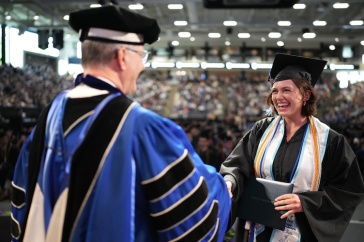
Economic concepts can be hard for students to grasp. For Robert Mohr, an associate professor of economics, this challenge provides an opportunity to apply economic theory to real-world problems and excite students about a new discipline.
“He is constantly experimenting with new approaches, whether that be with electronic learning platforms, classroom clickers or collaborative sessions designed to support the delivery of classroom material," says Neil Niman, Mohr’s former department chair and current associate dean of academic programs for Paul College.
This continuous improvement approach to teaching lead to Mohr being named the recipient of this year’s Peter T. Paul College of Business and Economics Excellence in Teaching award.
“It felt really good to be recognized,” says Mohr, who was nominated for the award by his colleague and professor of economics, Karen Conway.
“I try to remind myself that this subject matter is easy once you get it, but hard until you do.”
“Robert is particularly adept at simplifying complex ideas and showing students how economics can contribute to the development of a better understanding of the world in which they live,” says Niman.
“I try to remind myself that this subject matter is easy once you get it, but hard until you do,” says Mohr.
He aims to showcase classroom content in a context that is easy for his students to understand, often using in-class exercises so his students can see an economic concept in action. And he rewards them when they get it right — Mohr is known to high-five his students when he sees them successfully understanding these concepts.
During his time at the University of New Hampshire, Mohr has developed two innovative classes for economics students. The first, called The Economics of Climate Change, takes the complex modern problem of climate change and shows how the economics tools that students have previously learned can be applied to develop effective policy solutions.
“It shows them that economics isn’t just graphs, numbers and formulas,” says Mohr. “You can apply what you’ve learned to a real problem.”
Mohr took a similar problem-based learning approach to designing his senior capstone course for economics majors. In the course, students integrate what they’ve learned during their time as economics majors and apply economics techniques to current public policy issues. The issues can range from the economics of healthcare and education to immigration and the budget deficit. The class culminates with each student creating a research poster on their chosen public policy topic that they present at the university’s Undergraduate Research Conference.
While Mohr greatly enjoys teaching these two upper-level classes, his favorite part about teaching might actually involve underclassmen.
“I like interacting with my students,” he says. “Particularly freshmen, because I can open their eyes to a new discipline and make a case that it really matters.”
-
Written By:
Whittney Gould | Peter T. Paul College of Business and Economics | whittney.gould@unh.edu | 603-862-1704
















































